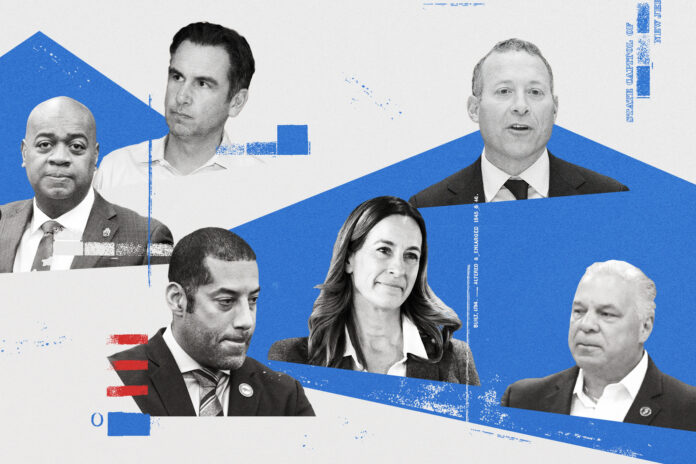New Jersey’s political scene in 2025 is marked by the Democratic Party’s solid control over state government, holding a trifecta with the governorship and majorities in both legislative chambers. The recent November elections brought a historic shift as Mikie Sherrill was elected Governor, set to succeed Phil Murphy, who was term-limited. Sherrill will make history as the first female Democratic governor of New Jersey when she is sworn in on January 20, 2026, signaling both continuity and a new chapter in Garden State politics.
The Democratic Party’s dominance extends across all major statewide offices, including the Secretary of State, Attorney General, and State Treasurer, while maintaining robust control of the State Senate and General Assembly. The party also increased its majority in the General Assembly during the 2025 elections, securing at least 55 seats—its largest majority in over 50 years. Craig Coughlin serves as Speaker of the General Assembly, guiding the legislative agenda in alignment with the party’s priorities.
New Jersey’s congressional delegation features a mix of Democrats and Republicans, but the gubernatorial election has triggered a special election to fill Sherrill’s former 11th congressional district seat. The race is already drawing attention, with candidates including Assemblywoman Verlina Reynolds-Jackson, Somerset Commissioner Shanel Robinson, East Brunswick Mayor Brad Cohen, and Millstone Mayor Ray Heck emerging as prominent contenders. The contest is shaping up as a key political battle between Mercer and Somerset counties, highlighting regional dynamics and party strategy for upcoming federal representation.
Several pressing issues dominate New Jersey’s political discourse, particularly affordability, property taxes, school funding, and long-term fiscal stability. The 2025 elections also reflected voter adaptation to a redesigned statewide ballot system, following the constitutional ruling that eliminated the old “county line” format.
Legislatively, 2025 was a productive year with a range of laws signed into effect, spanning labor, education, infrastructure, and fiscal policy. In labor and employment, protections against “captive audience” meetings were strengthened, ensuring employees cannot be coerced into attending political or religious workplace events. Transparency in wages became mandatory under the new Pay Transparency Act, and the state’s minimum wage increased to $15.49 per hour. Family Leave Insurance qualifications were adjusted to broaden employee access, demonstrating continued emphasis on worker rights and protections.
Education and infrastructure also saw significant investments. New Jersey codified its preschool funding formula, expanded universal preschool access, and provided a $908 million increase in K-12 education funding, completing a seven-year phase-in plan. Infrastructure improvements were supported through loans authorized by the NJ Infrastructure Bank for transportation and environmental projects, ensuring long-term benefits to communities statewide.
Fiscal measures included a $55.9 billion state budget, incorporating a $6.1 billion surplus, record property tax relief through the ANCHOR program, and expanded support for NJ Transit and educational initiatives. The “Stay NJ” program provided seniors with property tax reimbursements, while the Independent Health Care Appeals Program eliminated fees for challenging denied health insurance claims. Tax incentives for film and digital media production were also updated, fostering economic development in creative industries.
Public policy changes in 2025 touched voting and transportation regulations as well. The primary election date was moved to avoid religious conflicts, and new driving requirements mandated permit holders under 21 to complete at least 50 hours of supervised driving before obtaining a probationary license. Meanwhile, New Jersey’s Attorneys General joined their counterparts from New York, Minnesota, and California in challenging federal decisions to suspend SNAP benefits, citing constitutional and legal concerns affecting tens of thousands of residents.
New Jersey’s 2026 political cycle is already taking shape, particularly in the Democratic primary for the 12th Congressional District. The contest highlights a generational and regional divide, with candidates like Robinson and Reynolds-Jackson bringing experience in local government, military service, and advocacy for voting rights. Their campaigns reflect broader themes in state politics, including community resilience, environmental recovery, and equity in representation.
For residents and observers wanting to stay informed on political developments, legislation, and elections in New Jersey, Explore New Jersey’s Politics Section provides up-to-date coverage, analysis, and insight into the state’s evolving political landscape.
New Jersey’s 2025 political scene demonstrates a combination of historic milestones, legislative achievement, and emerging electoral contests, setting the stage for an influential year ahead as the state navigates leadership transitions, policy priorities, and voter engagement.












